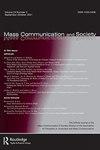研究不信任在科学和社交媒体使用中的作用:使用小组数据对COVID误解易感性的影响
IF 2.7
2区 文学
Q1 COMMUNICATION
引用次数: 0
摘要
摘要在美国,人们对科学工作者和科研机构的信任处于历史最低点。与此同时,研究表明,人们使用社交媒体获取科学信息,越来越容易受到与covid -19相关的错误信息的影响。然而,我们不知道是否低水平的信任首先导致人们转向社交媒体。我们认为,如果人们不相信科学家提供的科学信息,他们可能会转向社交媒体获取替代的科学信息(而不是依靠主流来源获取与大流行相关的信息),这反过来又会增加对COVID-19误解的易感性。基于两波美国面板数据,我们发现对科学的不信任推动了社交媒体对COVID-19信息的使用,而对社交媒体对COVID-19信息的依赖增加了对COVID-19误解的敏感性。免责声明作为对作者和研究人员的服务,我们提供了这个版本的已接受的手稿(AM)。在最终出版版本记录(VoR)之前,将对该手稿进行编辑、排版和审查。在制作和印前,可能会发现可能影响内容的错误,所有适用于期刊的法律免责声明也与这些版本有关。李双元(威斯康星大学麦迪逊分校博士),高丽大学媒体与传播学院助理教授。他的研究考察了新媒体技术(如社交媒体、人工智能等)如何影响我们的日常生活和整个社会。Mo Jones-Jang(密歇根大学博士),波士顿学院传播系副教授。他的研究重点是人工智能和科学背景下的错误信息。ChungMyojung,美国雪城大学博士,美国东北大学新闻学院助理教授。她的主要研究集中在数字时代人们如何处理和传播错误信息以及如何打击错误信息。Edmund W. J. Lee(博士,南洋理工大学),新加坡南洋理工大学通信与信息学院助理教授,信息完整性与互联网中心(IN-cube)助理主任。李的研究重点是开发卫生技术来解决卫生不平等问题,以及如何以智能和道德的方式利用数字痕迹数据来理解和改善公共卫生结果。Trevor Diehl(维也纳大学博士),中密歇根大学广播与电影艺术学院副教授。他的研究兴趣包括社交媒体新闻受众和政治参与、多平台新闻和新兴新闻实践。本文章由计算机程序翻译,如有差异,请以英文原文为准。
Examining the Role of Distrust in Science and Social Media Use: Effects on Susceptibility to COVID Misperceptions with Panel Data
ABSTRACTTrust in scientific actors and institutions in the United States is at an all-time low. At the same time, studies show that people use social media for science information and become increasingly vulnerable to COVID-19-related misinformation. Yet, we do not know whether low levels of trust cause people to turn to social media in the first place. We argue that if people do not trust the scientific information provided by scientists, they are likely to turn to social media to get alternative scientific information (rather than relying on mainstream sources to get pandemic-related information), which in turn can increase susceptibility to COVID-19 misperceptions. Based on two-wave U.S. panel data, we found that distrust in science drives the uses of social media for COVID-19 information, and reliance on social media for COVID-19 information increases susceptibility to COVID-19 misperceptions.DisclaimerAs a service to authors and researchers we are providing this version of an accepted manuscript (AM). Copyediting, typesetting, and review of the resulting proofs will be undertaken on this manuscript before final publication of the Version of Record (VoR). During production and pre-press, errors may be discovered which could affect the content, and all legal disclaimers that apply to the journal relate to these versions also. Additional informationNotes on contributorsSangwon LeeSangwon Lee (Ph.D., University of Wisconsin-Madison) is an Assistant Professor in the School of Media & Communication at Korea University. His research examines how new media technologies (e.g., social media, AI, etc.) impact our daily lives and society as a whole.S Mo Jones-JangS Mo Jones-Jang (Ph.D., University of Michigan) is an Associate Professor in the Department of Communication at Boston College. His research focuses on AI and misinformation in the science context.Myojung ChungMyojung Chung (Ph.D., Syracuse University) is an Assistant Professor in the School of Journalism at Northeastern University. Her primary research focuses on how people process and distribute misinformation in the digital era and how to combat misinformation.Edmund W. J. LeeEdmund W. J. Lee (Ph.D., Nanyang Technological University) is an Assistant Professor at the Wee Kim Wee School of Communication and Information at Nanyang Technological University, Singapore, and Assistant Director at the Centre for Information Integrity and the Internet (IN-cube). Lee’s research focuses on developing health technologies to tackle health inequalities, and how to take advantage of digital traces data in an intelligent and ethical manner to understand and improve public health outcomes.Trevor DiehlTrevor Diehl (Ph.D., University of Vienna) is an Associate Professor at Central Michigan University at the School of Broadcast and Cinematic Arts. His research interests include social media news audiences and political participation, multiplatform news, and emerging journalism practices.
求助全文
通过发布文献求助,成功后即可免费获取论文全文。
去求助
来源期刊

Mass Communication and Society
COMMUNICATION-
CiteScore
6.90
自引率
3.30%
发文量
58
期刊介绍:
Mass Communication and Society" mission is to publish articles from a wide variety of perspectives and approaches that advance mass communication theory, especially at the societal or macrosocial level. It draws heavily from many other disciplines, including sociology, psychology, anthropology, philosophy, law, and history. Methodologically, journal articles employ qualitative and quantitative methods, survey research, ethnography, laboratory experiments, historical methods, and legal analysis.
 求助内容:
求助内容: 应助结果提醒方式:
应助结果提醒方式:


